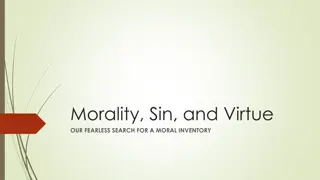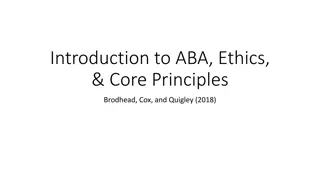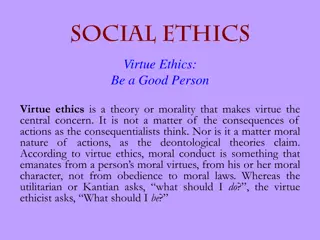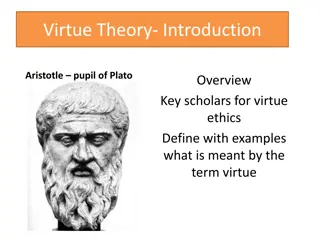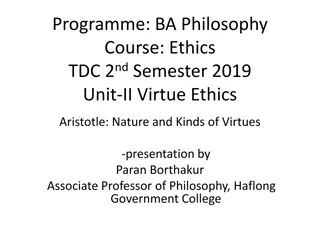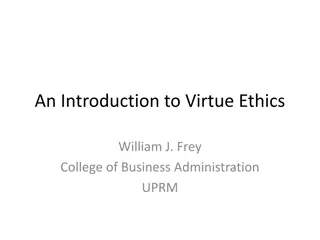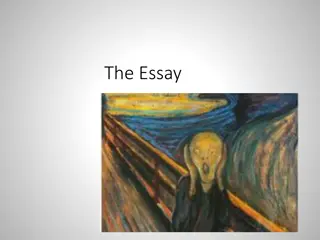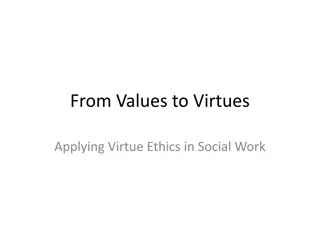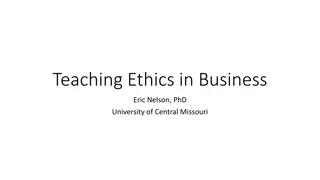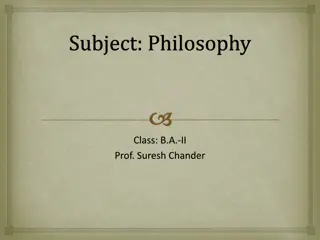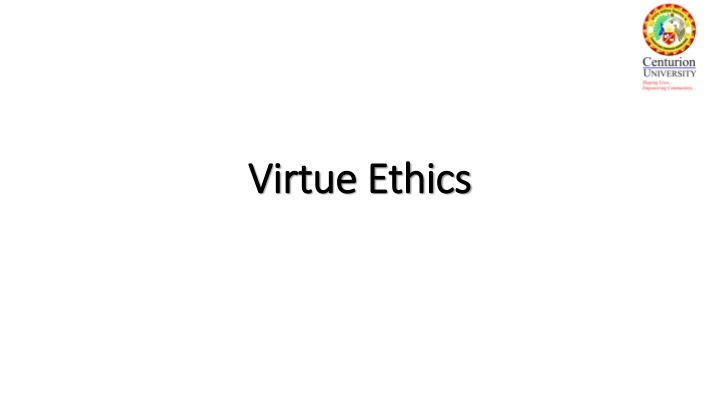
Virtue Ethics: Origins, Theories, and Practical Wisdom
Learn about the origins of virtue ethics from Ancient Greece and its connection to practical wisdom, explore Socrates and Plato's theories on virtue, and understand the importance of knowledge and character in ethical actions.
Download Presentation

Please find below an Image/Link to download the presentation.
The content on the website is provided AS IS for your information and personal use only. It may not be sold, licensed, or shared on other websites without obtaining consent from the author. If you encounter any issues during the download, it is possible that the publisher has removed the file from their server.
You are allowed to download the files provided on this website for personal or commercial use, subject to the condition that they are used lawfully. All files are the property of their respective owners.
The content on the website is provided AS IS for your information and personal use only. It may not be sold, licensed, or shared on other websites without obtaining consent from the author.
E N D
Presentation Transcript
Virtue Ethics Virtue Ethics
Origins of Virtue Ethics Origins of Virtue Ethics The theory of virtue ethics originates in Ancient Greece, though some connections can be drawn as far back as Ancient China. In Greek, virtue (ar te) means excellence . Socrates once claimed: it s the greatest good for a man to discuss virtue all day on the grounds that the unexamined life is not worth living (The Apology). 04-04-2025 2
Socrates/Platos theory of virtue Socrates/Plato s theory of virtue Virtue is supposed to be a kind of knowledge; It is identified with wisdom (sophia); Wisdom is both necessary and sufficient for virtue; Knowledge about virtue is somehow analogous to mathematical knowledge; Both kinds of knowledge are the result of a self- reflective process called recollection . 04-04-2025 3
A Problem of Knowledge A Problem of Knowledge Since virtue concerns action, it is possible to act well without knowing how to act well; As long as someone has the right belief about which actions are good, he or she will act virtuously; But belief without knowledge is unstable and fleeting; This is why it is necessary to have, not just true belief, but knowledge, which is justified true belief. 04-04-2025 4
Practical Wisdom or Prudence Practical Wisdom or Prudence With Aristotle, we distinguish the kind of wisdom necessary for ethical action from wisdom in the sciences. The wisdom necessary for action is practicalwisdom (phron sis) or good moral judgment. Aquinas calls this prudence (prudentia). Judgment applies to a range of different situations, which is why it requires experience to acquire. Good judgment enables a person to make the right sort of decision in the right kind of circumstances at the right time. 04-04-2025 5
Virtue and Character Virtue and Character To be virtuous is to have a virtuous character. Character is an ingrained habit or disposition to act in certain ways. Virtuous action must come from a virtuous character (as opposed to some external force). The virtuous person wants to act virtuously and does so for that reason alone. 04-04-2025 6
Character continued Dispositions or character traits are to be understood broadly, so that a virtuous person is virtuous in many different situations. For example, an honest person not only tells the truth, but doesn t cheat, respects contracts, obeys the laws, and doesn t misrepresent him/herself. And the honest person does this because he or she prefers to be honest, not because he/she wants to avoid some bad consequence. For this reason, it is unwise to attribute a virtue to someone on the basis of one or a few actions. 04-04-2025 7
Habit: how to acquire virtue With respect to the moral virtues, Aristotle thinks we learn by doing . Virtue requires discipline and practice. Repeated virtuous actions help to ingrain the character traits or dispositions that make a person virtuous. Making virtuous decisions requires good moral judgment (reason), so there is an essential, rational component as well. 04-04-2025 8
An analogy One of the easiest ways to think of how to acquire moral character is by comparing it to skills like the ability to play a sport or a musical instrument. A person who practices hard and trains her body acquires the skills to be able to do that skill well. The skilled athlete or musician is also the one who is better able to practice, reinforcing her skill. The skilled athlete or musician actually physically changes his or her body through repetitious actions. In the same way, the virtuous person finds it easier to act virtuously; she actually changes her physical and emotional characteristics. 04-04-2025 9
Review Virtue ethics is the theory that moral goods involve acquiring a virtuous character. Virtues are either moral or intellectual. Moral virtues involve acquiring a character through practice, by ingraining habits or dispositions to act well. Making good choices, practicing good habits, and acting well all involve good moral judgment (the application of reason to changing, practical situations). Good moral judgment, good actions, and a good character ultimately make a person happy. 04-04-2025 10
Thank You Thank You 04-04-2025 11




